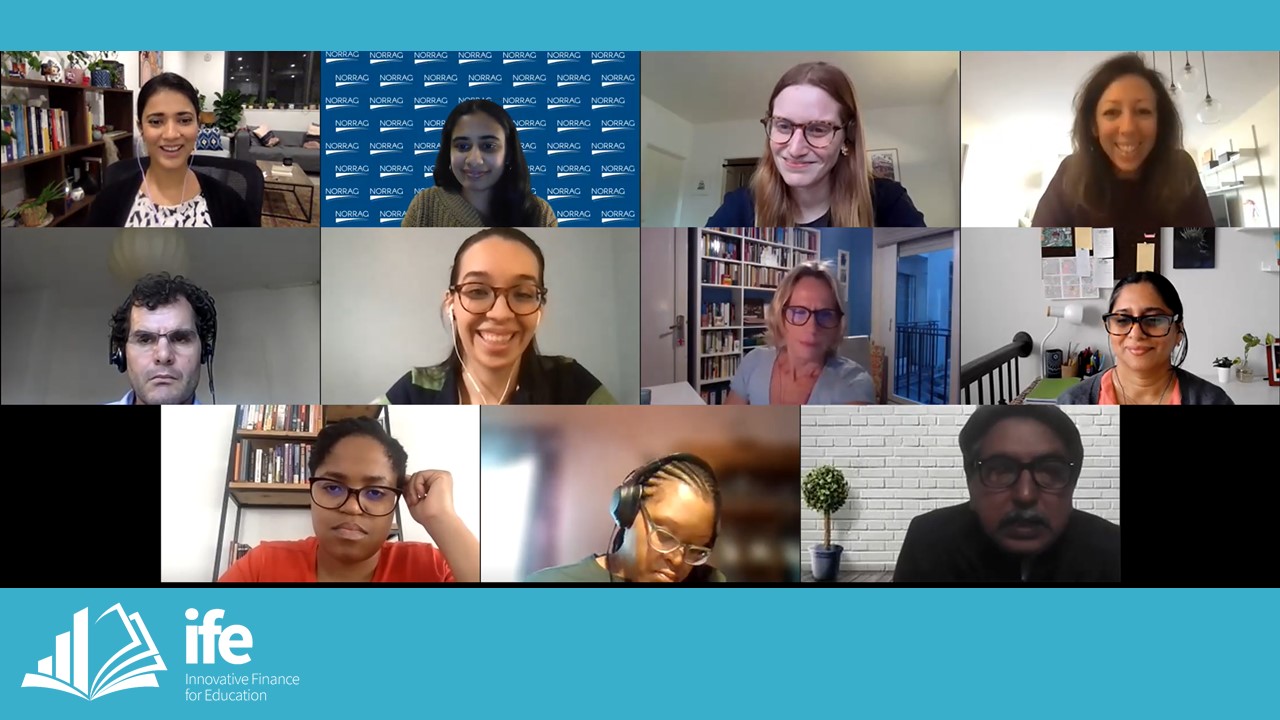Event Highlights: Closing meeting for the COFER Innovative Financing in Education and Development Project
On 18th November 2021, NORRAG organized a closing consortium meeting for the COFER Innovative Financing in Education (IFE) and Development: Case Studies and Multi-Media Material for eLearning project, which is partially funded by the Swissuniversities Development and Cooperation Network (SUDAC). NORRAG welcomed representatives from five partner organizations in Switzerland, South Africa, India, and Argentina. The goal of this meeting was to recap the outcomes of the project to all partners and use it as a venue for reflecting on learnings, challenges, and next steps.
The meeting kicked off with Cathryn Magno (University of Fribourg) and Marina Dreux Frotté (NORRAG) giving a brief outline of the goals and outcomes of the project.
The project started with the aim of producing research grounded in academic literature and real-life experiences on the topic of IFE. It also aimed at creating learning materials for both education sector experts and finance experts who are interested in utilizing innovative financing to attract more and better funding to education and to achieve Sustainable Development Goal 4 (Quality Education). Therefore, the first outcome of the project was the publication of a systematic literature review, which included a discussion on the argued benefits and challenges of IFE, as well as a typology of innovative financing mechanisms in the sector. One of the goals was to also strengthen the knowledge on the various innovative financing mechanisms proposed for the sector. Hence, a series of short animated videos were produced. Next, as it was important to build an understanding on how the concepts of innovative financing are applied in different ways in different places, the project developed multiple in-depth case studies and short case studies in the context of Argentina, Central America, Colombia, Ethiopia, Ghana, India, Kenya, Latina America and the Caribbean, Nepal and Tanzania. Additionally, the project team went beyond its initial plan and did many activities like lectures and workshops on the topic, including a Masters level course taught at the Graduate Institute, Geneva. Presently, an executive education course is in the works.
The next part of the meeting involved a discussion between all participants on their learnings, their journey with the research and challenges faced while engaging with IFE.
The overarching comment throughout the discussion was the opportunity this project offered to learn about IFE, a topic that was new to most partners present at the meeting. Archana Mehendale (Tata Institute of Social Sciences) added to this discussion by saying that she not only learned about the content, but also the language used and the technical aspects of IFE. Secondly, Archana spoke about how she understood more closely the landscape itself. It was particularly important to understand this in the Indian context because these actors play a great role in influencing public policies as well as the nature of education enterprises that are coming up in the private sector. Adding to the discussion about key actors, Felicitas Acosta (Universidad Nacional de General Sarmiento) brought up the challenge involved in gaining access to the individuals involved in the case studied whose insights were an important aspect of her research model.
Another common comment during the meeting was the usefulness of the case studies and animated videos as a teaching tool. Both Ajay Singh (Tata Institute of Social Sciences) and Markus Maurer (Zurich University of Teacher Education) spoke about their positive experiences when using these resources in their classrooms and Nicholas Burnett spoke about his intention of using them in his future teaching endeavours. Aleesha Taylor reflected on the development of the research and teaching content since the first course on innovative financing for education was taught for professionals at the Central European University in 2012.
Lastly, multiple issues and questions were brought up during the discussion for future research. Nicholas Burnett underscored the importance of estimating the actual cost of doing such innovative financing projects. Although such projects seem costly, there is still no work done to estimate exactly how costly it could be. Markus Maurer added that such projects also require a lot of expertise and the knowledge capacity on the side of the implementers can be a limitation for successful implementation. Finally, Kentse Radebe (Bertha Centre) spoke about the need to understand the unintended effects of such projects due to their narrow focus on outcomes.
While the COFER IFE and Development: Case Studies and Multi-Media Material for eLearning project is wrapping up, NORRAG and its partners continue the endeavour of building empirical evidence on the additionally and efficiency of IFE and its impact on provision, quality and equity in education. Keep an eye on the NORRAG IFE page for upcoming news and events on the topic.

